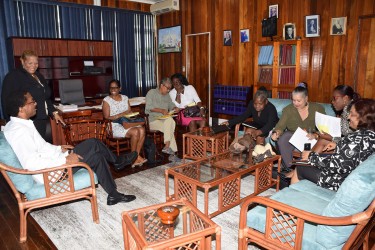Seven women representatives from a group of NGOs recently engaged Minister of Legal Affairs and Attorney General Basil Williams on key concerns related to access to justice and the functioning of courts in the interior.
Omattie Madray of ChildLink, Karen DeSouza and Nicola Marcus of Red Thread, Schemel Patrick of SASOD, Emily Dodson of the Guyana Association of Women Lawyers, Danuta Radzik of Help and Shelter and Patricia Sheerattan Bisnauth of the Guyana Responsible Parenthood Association engaged in a lively discussion with the minister on several issues regarding the response to juvenile crime., including the enactment of the Juvenile Justice Bill.

A release from the Ministry of Legal Affairs on the meeting said that DeSouza recommended that National Service be re-introduced, explaining that she is a graduate of this service and can attest first-hand to its benefits. Other members of the delegation strongly supported this submission. The attorney general said the group’s solid recommendation of national service has sold him on its benefits as an option to be explored in relation to juvenile crime.
The group also discussed access to justice, the functioning of courts in the interior, the activation of night courts, alternative sentencing, specialised courts for sexual offences, training for the judiciary, magistracy and court officers, coroner’s inquest and the prevention of discrimination act 1997 on the grounds of sexual orientation, the need for lay magistrates to speed up the delivery of justice, the operation of the family court and the removal the Linden magistracy from under the Demerara Magisterial district as persons have to travel from Linden to Vreed-en-Hoop to conduct judicial business.
Williams pointed out that every magistrate is a coroner and has the power to conduct inquests into violent and unnatural deaths. He also noted that while sound recommendations were made regarding several of the matters, funding is needed to implement most of them, particularly for improvements in the delivery of judicial services and the dispensation of justice.
The meeting also discussed raising the age of criminal responsibility, extensive training for magistrates prior to ascension to the Bench and continuous training thereafter to curb the vexing issue of the culture of remand for bailable offences, granting frequent adjournments for “flimsy” reasons, inconsistent sentencing and greater use of alternative sentencing for first time offenders. Recommendations were also made for probation officers in every court and for all judicial officers in the justice system to be exposed to gender sensitive training.
The attorney general thanked the delegation for their input and committed to working with organisations toward the timely delivery of justice particularly to women, children, the poor and marginalised members of the society.





